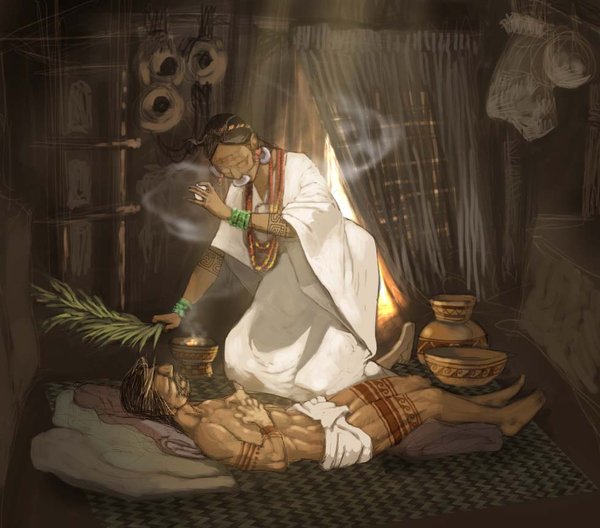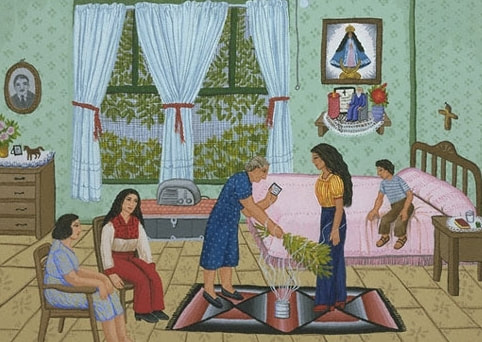Dona Louisa was a curandera, the Mexican answer to a witch doctor. Curanderas healed the sick and warded off evil spirits. When a gringo doctor failed, the Mexican community turned to the curandera to figure out what was wrong and how to cure it.
Usually the problem was a curse placed upon the patient by someone else. The curandera used a mixture of magic and Catholicism to exorcise the curse and return the patient to full health. Usually, the curandera prepared a potion of herbs, said prayers, and performed ancient rituals.
The knowledge of curanderas was passed down from generation to generation. You don’t just decide to become a curandera, it’s not like making a career choice. You were chosen. God grants special powers to special people, usually women but not always. If the curandera sees that someone has been chosen by God, then she takes them under her wing and teaches them the ancient healing arts.
Dona Louisa was a curandera, but she was also a bruja (witch). Every child in the community knew why there was always a ladder against her house. At midnight, she grabbed the broom, and climbed the ladder to her roof, then she took off and flew through the night sky on her broom. Being a witch, the little children knew, she ate small children. When Mama was little, whenever she had to walk past Dona Louisa’s house, she ran so that the old bruja couldn’t catch her. She didn’t want to be the honored guest at dinner.
Grandma was also a curandera. She didn’t like it; she didn’t ask to be one. She was given the power by God and she had no choice, but the power scared her. She was frightened of her supernatural abilities. She hid her gift from her children and from the neighbors.
But there is no way to hide anything from your children. They knew. Late at night strangers came to their house and begged Grandma to help. She always sent them to Doña Louisa. Occasionally Doña Louisa would not be available and Grandma was honor bound to help.
Late one night when Mama was six years old there came a knock at the door. A young woman stood at the door with a baby in her arms. The baby howled in pain.
“Doña Roberta,” pleaded the young woman, “my baby is sick. You must help me. The gringo doctors can’t do anything for him and I fear that he is dying.”
“No,” said Grandma. “You must take him to Doña Louisa.”
“But señora, Doña Louisa is not at home. Her neighbors say that she is out of town. Please help me; I fear that my baby will not make it through the night.”
Grandma relented. She could not refuse to help so desperate a case.
“I think he has empacho, or susto,” replied the woman. Empacho is colic, susto means that someone has scared you.
Grandma took the baby and laid him out on the table in her kitchen. She removed his diapers and examined him. “No,” she said, “he has ojo.” Ojo is the evil eye. Someone had looked at this perfect little baby and wished it was theirs, now it suffered from their envy.
“You go home and pray,” Grandma told the young woman, “and bring the baby back just before midnight. Don’t be late mind you; if we are to save this baby, we must act at precisely midnight.”
While the woman was gone, Grandma set about gathering her herbs. She lit a kerosene lantern and visited her herb garden. Then she wandered to the forest of trees along the edge of their farm and hunted for the special plants that she needed to heal the baby.
When she returned to the house, she checked to make sure that all her children were asleep. She didn’t want them to witness what was about to occur. Mama, who was awake and was watching her mother through the window, saw the light returning to the house and dashed for her bed, which she shared with her sister Ester. She dived under the covers and closed her eyes, pretending to be asleep as Grandma opened the door to look in.
Satisfied that there would be no witnesses, Grandma took her molcajete (mortar and pestle) from the shelf in the kitchen and began to grind her herbs and leaves to make a potion. A few minutes before midnight there was a knock at the door. The young woman had returned.
Grandma took the baby and wrapped it in a blanket. She put her supplies in a canvas bag and slung it over her shoulder, then stepped outside with the woman. Mama tip toed from her room to the door to watch.
There was a deep drainage ditch along the road with tulle bushes at least five feet tall. Mama sprinted to the cover of the ditch and followed Grandma and the woman to see what they were going to do. They walked about a half a mile down the road until they came to an intersection.
With every step Grandma mumbled a prayer. She was saying an ancient chant that was old when the Aztecs ruled Mexico. All the while the baby cried. It cried and cried and never relented.
In the center of the intersection, a perfect cross, Grandma painted another cross with lime she had taken out of her sack. Then she put a circle of candles around the cross and lit them, mumbling a prayer as she lit each one. She returned to her cross and covered the lime with eucalyptus leaves.

They walked back to the house, Grandma mumbling ancient chants and prayers all the way and the baby crying. Mama followed along in the ditch.
When they returned to the house, Grandma painted a cross on the mattress of a crib with her lime. Once again, she covered the lime cross with eucalyptus leaves. She took the baby from its mother and placed it on the cross. Then she took some of the potion she had prepared and anointed the baby, on the forehead, on the chest and on the shoulders in the sign of the cross.
“En el nombre sea de Dios, y la Santisama Trinidad,” (In the name of God, and the holy trinity) she prayed. She broke an egg into a cup, painted a cross under the crib with lime and covered it with the leaves. She placed the cup with the egg in the center of the cross. Then she turned to the mother.
“You go home now. You can return in the morning.”
The mother went home, and Grandma went to bed. Mama snuck back into her bed and dozed.
In the morning, there was silence in the house. Mama jumped out of bed to see what miracle had happened. As she reached the kitchen, she saw Grandma holding the cooing baby, feeding it a bottle of milk. The baby ate heartily and cooed and giggled. Mama entered the room and looked at the crib with its crosses and the cup with the egg.
The egg had turned a dark ugly green.
“Mama, what happened?” she asked.
“The egg has drawn out the evil spirits. When his mother returns, I must dispose of the egg safely so that they won’t infect anyone else.”

If you liked today's post, then you have to read The Mexican Connection, the first Ted Higuera book that takes place in Mexico. You'll learn a lot more about Mexican families and culture and go on a wild ride while Ted hunts the Mexican drug cartels.


 RSS Feed
RSS Feed